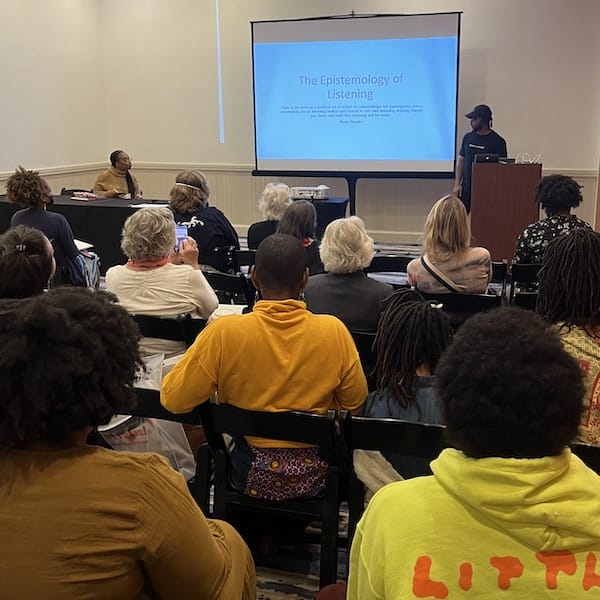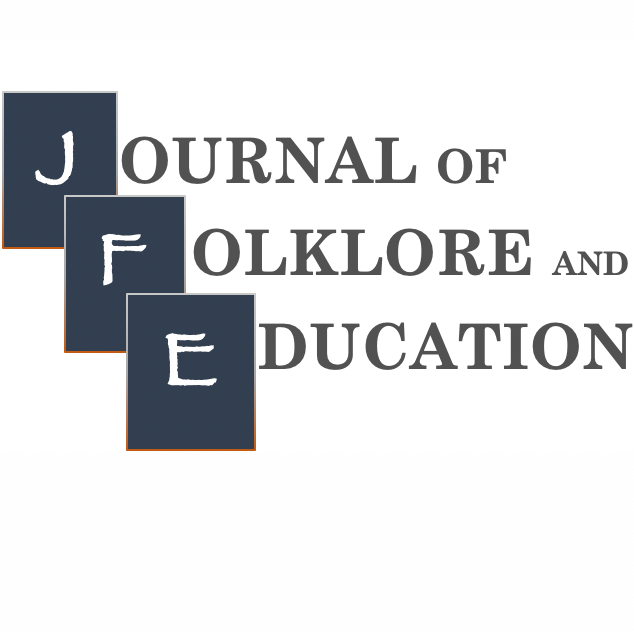Teaching with Folk Sources
Counter(ing) Narratives to the American Story with Ethnographic and Oral History Collections
Teaching with Primary Sources (TPS) is the Library of Congress’ premier educational program, focused on helping educators enhance students’ critical thinking, analysis skills, and content knowledge using the Library’s collections of millions of digitized primary sources. The Local Learning project team offers teaching tools and materials that engage the digitally available archival holdings of the American Folklife Center of the Library of Congress alongside local and regional collections, bringing them into conversation with each other to create a fuller, more complex narrative of American communities, history, and people.
Coming in Fall 2023: Curriculum Guides for Teachers with content focus areas of Farming/Occupation, Migration (Migrant workers), Home, Miami Stories, Tulsa Race Massacre, Chilocco Indian Agricultural School, Oral History and Interviews, Visual Texts, and Ethnography. It will be published by the Journal of Folklore and Education.
Professional Development
Workshop Announcements!
Learning Activities
Dig into our activities and readings.
Special TPS Issue
Teaching with Folk Sources
Our learning activities demonstrate the value of ethnographic and oral history primary source materials in K-12 classrooms, with emphasis on their value in exploring Diversity, Equity, and Inclusion (DEI) concerns on a national scale through the lens of “Challenging History through Counternarratives.” Our project partners include the Vermont Folklife Center, Oklahoma State University Library and OSU Writing Project, and HistoryMiami Museum.
Challenging History: Teaching hard history and topics that may engage unjust content.
Challenging History: Offering training and learning resources through oral histories and primary source collections gathered through ethnographic research to offer diverse perspectives for analysis and inquiry.
Our Teaching with Primary Sources Priorities
- Create a roadmap for partners representing diverse communities, beliefs, and endeavors to use American Folklife Center (AFC) collections of the Library of Congress to engage, inspire, and inform learners of all ages. AFC collections offer universal and enduring sources of knowledge and creativity that are under-utilized in formal and informal education.
- Cultivate synergies between regional collections and the AFC collections that have been siloed in their outreach and education work. The partners of this consortium all bring our own expertise to the sections we help write and develop–from statewide/regional archives, a museum archive and collection, university libraries, community-based organizations and collections, and teacher training and curriculum development. Through the course of this project we will have better understood each other’s unique sectoral spaces in a way that enriches the partner entities, their stakeholders, and the subsequent deliverables of the project collectively.
- Folklife partners engage with identified materials in the AFC collections that relate back to their states/regions, creating ground-up amplification of primary sources in revelatory ways.
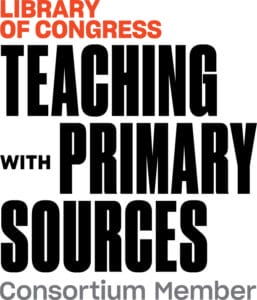
Oral histories and ethnographic materials help present complicated issues and topics by comparing and contrasting life experiences, voices and vantage points. Although they do often reflect historical truth, primary sources are valued as powerful reference points for understanding individual and community perspectives on memory, meaning and identity. Over the past 150 years folklorists and other ethnographic researchers in the U.S. have created a unique, enormous corpus of ethnographic field collections: multi-format, unpublished groups of materials documenting human life and traditions, from historic photographs of the Tulsa Race Massacre to contemporary civil rights recordings, graffiti art documented by Martha Cooper to Amplifier social justice posters, and more.
Click on a region below to explore the folklife archives here.
National Folklore Archive Repositories
We invite readers to help us crowdsource community archives and collections that offer opportunities for teaching and learning using primary sources. Contact us to suggest additional archives for this resource. Thanks to Katey Borland, Danille Elise Christensen, and Jordan Lovejoy for seeding this list in their Journal of Folklore and Education article “Ethnographic Collections in the Classroom: Teaching Research and Composition Through Community-Centered Archives.”
American Folklife Center at the Library of Congress provides abundant digitized music, audio recordings, photographs, and document collections. Read A Commonwealth of Cultures to learn more about the discipline of folklore. Use the Teacher’s Guide to Folklife Resources to find free education resources. AFC’s Veterans History Project site allows users to hear and view veterans’ stories and provides kits for collecting local stories.
Library of Congress has extensive resources for educators and students, including summer institutes, lesson plans, blogs, and more.
Masters of Traditional Arts is an online guide that links users to multimedia resources for 26 NEA National Heritage Fellows. Units of study such as Sense of Place, Sense of Wonder, Sense of Discovery and classroom activities model how educators can develop lessons and incorporate regional folk artists into their teaching.
OurStoryBridge’s free downloadable resources for educators include the Teacher’s Guide, a tool bringing over 800 primary source narratives into the classroom organized by category and academic discipline; DEI Stories, with over 200 brief personal narratives; a Sample School Assignment; and School Story Bridge which guides teachers in collecting stories from students. OurStoryBridge is a nationwide grassroots nonprofit that provides free resources and tools to collect and post online local 3-to 5-minute audio stories. Read their Journal of Folklore and Education article here: https://jfepublications.org/article/ourstorybridge
Oral History Association offers online resources, annual meeting schedules, and useful links.
Smithsonian Folkways Recordings offers hundreds of recordings from around the world, an online magazine, and in Tools for Teaching find lesson plans and interactive features.
New England
Regional Folklife Archives from Connecticut, Maine, Massachusetts, New Hampshire, Rhode Island, and Vermont.
Connecticut
Connecticut Cultural Heritage Arts Program Collection The Connecticut Museum of Culture and History incorporated the Connecticut Cultural Heritage Arts Program (CCHAP), the state folk and traditional arts initiative, in 2015. The museum has since digitized and accessioned the CCHAP documentary archive dating back to 1991, which includes audio, photographs, video, ephemera, and manuscripts documenting folklife, traditional arts, and culture keepers in Connecticut, Rhode Island, and Massachusetts. Fully cataloged archival materials can be accessed online through the Connecticut Digital Archive as well as through ConnecticutMuseum.org, and CCHAP institutional archives can be accessed onsite at the Connecticut Museum. The Connecticut Museum has since folded CCHAP’s work into its overall mission and vision, and the archive continues to grow through the activities of its Department of Cultural Sustainability.
Maine
Accadian Archives at the University of Maine, Fort Kent documents the cultural heritage, folklife, traditional art and music of Franco-Americans and Accadians in the Upper St. John’s River Valley.
University of Maine Raymond H. Fogler Library Special Collections Department in Orono is home to the Northeast Archive of Folklore and Oral History, a leading collection of oral histories, traditional music, and photographs of the Northeast, formerly housed in the Maine Folklife Center. Contact: spc@umit.maine.edu.
Massachusetts
Harvard Folklore Collections https://guides.library.harvard.edu/gened1097/Harvard
The Mass Cultural Council Folk Arts & Heritage Archive, created in 1999, serves as the repository for materials generated by folklore fieldwork by staff, contracted folklorists and photographers, and interns. Field research focuses on traditional and vernacular music, dance, crafts, material culture, and traditional arts associated with annual celebrations and religious practice. The collection includes both analog and digital audio recordings, color slides, black and white negatives, digital images, and manuscript materials (field notes, transcriptions, release forms, ephemera). A small selection of materials are available online via the Mass Cultural Council website, and additional materials through the Massachusetts Archives Digital Repository. The full collection can be accessed in person at the Massachusetts Archives.
New Bedford Fishing Heritage Center preserves and presents the story of the commercial fishing industry past, present, and future through archives, exhibits, and programs. The Center provides a variety of educational opportunities for students of all ages. Programs can be tailored to the particular interests and ages of students. For more information, email programs@
New Hampshire
New Hampshire Library of Traditional Music & Dance includes books, periodicals, printed music, recordings, photographs, and archival materials pertaining to traditional music and dance in the United States and elsewhere, with a strong focus on New England traditions. In addition to materials collected by the University of New Hampshire, the collection also includes organizational collections from the Country Dance and Song Society and others.
Rhode Island
Rhode Island Folk Collection The Rhode Island State Archives houses the Rhode Island Folk Collection, consisting of records generated by folklorist Michael Bell of the Rhode Island Folklife Project from 1979-2007. Audio from digitized cassette tapes can be accessed online via the Rhode Island Digital Archive.
Vermont
Vermont Folklife Archive is an ethnographic collection of roughly 6000 audio and video recordings of interviews and music, approximately 25,000 still images and several hundred linear feet of manuscripts documenting the work of Vermont Folklife and others from the late 1940s to the present. Selected materials in the collection are available online via their Digital Collections database. They also maintain two other online collections, the Pawlet Community Study (1890-1990) and a collection of Senator Bernie Sanders Mitten Memes. For information on, and access to, materials in the collection, contact the Archivist.
Helen Hartness Flanders Ballad Collection Middlebury College Special Collections houses the Helen Hartness Flanders Ballad Collection. Created between 1930 and 1960 by Vermont song collector Helen Hartness Flanders (1890-1972), the collection consists of audio recordings, manuscripts, books and photographs documenting folk song and music in Vermont and New England.
Mid-Atlantic
Regional Folklife Archives from Maryland, New Jersey, New York, Pennsylvania, Virginia, and West Virginia.
Maryland
Chesapeake Bay Maritime Museum in St. Michaels preserves and documents local heritage and organizes exhibits, events, and school programs.
Havre de Grace Decoy Museum houses a large collection of working decoys from around the Chesapeake Bay. Summer classes are available and traditional carvers are on site every weekend.
Maryland Traditions Archives, housed at the University of Maryland Baltimore County, contains material from the work and programs of the Maryland Traditions program of the Maryland State Arts Council as well as donated collections from individuals and organizations.
Ward Museum of Wildfowl Art in Salisbury includes decorative as well as antique working decoys, with many regional styles represented. The museum offers school tour programs and the standards-based online guide Pass It On: Cultural Traditions of the Lower Eastern Shore.
New Jersey
Jersey Shore Folklife Center at Tuckerton Seaport documents, supports, and presents the diverse communities and traditions of the Jersey Shore and the Pinelands. The center offers classes, tours, school programs, artist demonstrations, and changing exhibits.
New York
New York Folklore Society offers programs and services to nurture traditional arts and culture in communities, furthering cultural equity and cross-cultural understanding. Resources include publications, links to folklife archives, and an annual conference. Contact: Ellen McHale, nyfs@nyfolklore.org.
Traditional Arts of Upstate New York (TAUNY) in Canton supports understanding and appreciation of North Country folk traditions and local culture. Their education website is North Country Folklore Online.
Pennsylvania
The Pennsylvania Center for Folklore at the Pennsylvania State University, Harrisburg provides programs, resources, and support for the study of Pennsylvania’s cultural heritage. The Center maintains folklife research collections such as the Pennsylvania Folklife Archives, Archives of Pennsylvania Folklore and Ethnography, Mac Barrick Folklore Collection, and John Yetter Collection of Steelton Photographs; organizes educational programs; offers technical support; and supports publications consistent with its mission. Contact: Anthony Buccitelli, abb20@psu.edu.
Historical Society of Pennsylvania in Philadelphia provides education workshops as well as online lessons and resources such as Exploring Diversity in Pennsylvania History. Contact: Joan Saverino, jsaverino@hsp.org.
Philadelphia Folklore Project (PFP) documents, supports, and presents folk arts and culture through fieldwork, archives, exhibits, performances, and media resources. The Folk Arts and Multicultural Education (FAME) program places artists in school and community residencies. PFP and Asian Americans United established a public charter school, Folk Arts-Cultural Treasures Charter School (FACTS), which was named a Blue Ribbon School by the U.S. Department of Education. Contact: pfp@folkloreproject.org.
Rivers of Steel National Heritage Area in Homestead houses and archive and coordinates and facilitates cultural and industrial heritage projects in southwestern Pennsylvania and provides school and community education programs.
The University of Pennsylvania Folklore and Ethnography Archives https://www.sas.upenn.edu/folklore/center/archive.html
Virginia
Virginia Foundation for the Humanities Folklife Program supports a wide array of documentation projects and a master-apprenticeship program. Contact: Jon Lohman, lohman@virginia.edu.
West Virginia
Appalachian Studies Association offers regional education resources.
Augusta Heritage Center in Elkins offers many programs, including summer workshops in folk arts, music, and dance. The center sponsors ongoing fieldwork and documentation of Appalachian folk artists and traditional culture.
Talking Across the Lines documents local people of diverse ethnic and economic backgrounds through audio recordings and photography and offers oral history workshops. Contact: Michael and Carrie Kline, kline@folktalk.org.
The Frank and Jane Gabor West Virginia Folklife Center on the campus of Fairmont State University is dedicated to the identification, preservation, and perpetuation of the region’s rich cultural heritage, through academic studies, educational programs, festivals and performances, and publications. Contact: wvfolklife@fairmontstate.edu.
The West Virginia Folklife Program, a project of the West Virginia Humanities Council, documents, preserves, presents, and supports West Virginia’s vibrant cultural heritage and living traditions. Find the program archives at https://wvfolklife.lib.wvu.edu. Contact: Emily Hilliard, hilliard@wvhumanities.org.
South East
Regional Folklife Resources from Alabama, Florida, Georgia, Kentucky, Louisiana, Mississippi, North Carolina, South Carolina, and Tennessee.
Regional
Digital Library of Appalachia http://dla.acaweb.org
Alabama
Alabama State Council on the Arts Folklife Program provides extensive support for documentation and projects statewide. Its public programs division, The Alabama Center for Traditional Culture, researches and presents programs on the state’s folk culture, including online radio programs and articles. Find publications and recordings useful in classrooms. Contact: Joey Brackner, joey.brackner@arts.alabama.gov.
Florida
Center for Gulf Coast Folklife in Tarpon Springs focuses on Gulf Coast folklife through exhibits, festivals, performances, workshops, and other programming founded in ethnographic research. Contact: Tina Bucuvalas, tbucuvalas@ctsfl.us.
The Florida Folklife Program documents and presents Florida’s folklife and folk arts. The program coordinates a wide range of projects to increase awareness of Floridians and visitors alike about the state’s traditional culture. Activities include an annual fieldwork survey, the Florida Folklife Apprenticeship Program, Florida Folk Heritage Awards, and Florida Folk Festival held every Memorial Day weekend in White Springs. The program also sponsors educational events, performances, classroom demonstrations, and online resources such as the award-winning Florida Music Train education guide. Contact: Amanda Hardeman, amanda.hardeman@dos.myflorida.com.
HistoryMiami preserves and celebrates Miami’s history through exhibits, tours, research, collections, and educational outreach. It is home to the South Florida Folklife Center, which hosts artist residencies at the museum and in classrooms. Online resources include multimedia artist profiles and exhibits. Contact: info@historymiami.org.
Georgia
NAMES Project AIDS Memorial Quilt is the world’s largest work of collaborative folk art. The website includes instructions on making a quilt square and upcoming viewings.
Kentucky
Appalshop in Whitesburg is a media and cultural center that has been documenting, exhibiting, and presenting Appalachian culture since 1969. Find many resources, including training opportunities, theater performances, recordings, films, and live broadcasts.
Kentucky Folklife Program in Bowling Green documents and presents Kentucky’s cultural resources and is now housed at Western Kentucky University. Contact: Brent Bjorkman, brent.bjorkman@wku.edu.
Louisiana
John and Alan Lomax in Louisiana, 1934 is a digital resource for the study of the 1934 trip to lower Louisiana, where the Lomaxes recorded a diverse array of songs in English and in Louisiana French. The site includes an interactive map, lyrics, and the recordings.
Louisiana Division of the Arts Folklife Program offers teacher and student resources, including information about Louisiana’s living traditions and the extensive award-winning online education guide Louisiana Voices. The Folklife Program archives are at Louisiana State University Library, Special Collections. Contact: Maida Owens, mowens@crt.state.la.us.
Louisiana Folklife Center at Northwestern State University produces the Natchitoches/NSU Folk Festival and the Louisiana State Fiddle Championship. They have an archival collection on Louisiana folklore.
The Center for Louisiana Studies at the University of Louisiana at Lafayette supports research, archives, and publications through the UL Press, the Research Division, and the Programming and Special Projects Division. The Archives of Cajun and Creole Folklore at University of Louisiana–Lafayette are at https://louisianadigitallibrary.org/islandora/object/ull-acc:collection
Mississippi
Center for the Study of Southern Culture at the University of Mississippi offers courses, events, conferences, and print resources.
Mississippi Oral History Project at the University of Southern Mississippi offers an online teaching guide, interviews, and other resources.
North Carolina
Center for Documentary Studies at Duke University is dedicated to documentary expression and its role in creating a more just society. They offer diverse ways to learn, make, and share documentary across all mediums—photography, film, video, writing, audio, experimental and new media.
Documenting the American South shares lessons and resources from the University of North Carolina Wilson Library collections.
North Carolina Folklife Institute supports programs and projects that recognize, document, and present traditional culture in North Carolina.
Pauli Murray Project is a part of the Duke Human Rights Center and engages community members, students, and educators in dialogue, mapping of stories, documentation, and storytelling about Durham history and social justice. Contact: Barbara Lau, balau@duke.edu.
Southern Folklife Collection is a multimedia site and archival resource dedicated to collecting, preserving, and disseminating vernacular music, art, and culture related to the American South. The collection is housed at the Wilson Library at the University of North Carolina – Chapel Hill.
University of North Carolina Department of American Studies Folklore Program offers an undergraduate minor and an MA degree for those interested in academic and public sector work, as well as content courses for education students. Contact: Patricia Sawin, sawin@unc.edu.
South Carolina
Appalachian English from the Joseph Sargent Hall recordings, University of South Carolina. http://artsandsciences.sc.edu/appalachianenglish/index.html
Digital Traditions provides access to materials from the Folklife Resource Center at the McKissick Museum in Columbia. Teacher resources include online guides such as Jubilation: African American Celebrations in the Southeast.
Penn Center on St. Helena Island preserves and promotes Gullah culture and heritage of the Sea Islands. Exhibits, programs, workshops, an annual festival, and teacher institutes are among its resources.
Tennessee
Center for Appalachian Studies and Services at East Tennessee State University in Johnson City is home of the Archives of Appalachia and offers graduate and undergraduate courses. ETSU’s School of Education offers a Storytelling Program associated with the National Storytelling Association in Jonesborough.
Center for Popular Music in Murfreesboro is an extensive archive and research center for the study of American popular music at Middle Tennessee State University. Their site offers recordings and resources.
Country Music Hall of Fame and Museum in Nashville features education workshops, songwriting residencies, and online learning resources. Contact: info@countrymusichalloffame.org.
International Storytelling Center in Jonesborough hosts events and research throughout the year as well as the annual National Storytelling Festival.
Tennessee Arts Commission Folklife Program conducts fieldwork research and develops programs and resources, including online publications for educators. Contact: Bradley Hanson, bradley.a.hanson@tn.gov.
Mid America
Regional Folklife Resources from Arkansas, Illinois, Indiana, Iowa, Kansas, Michigan, Minnesota, Missouri, Nebraska, North Dakota, Ohio, Oklahoma, South Dakota, Texas, Wisconsin.
Arkansas
Arkansas Folk and Traditional Arts is a statewide program of the University of Arkansas Libraries dedicated to building cross-cultural understanding by documenting, presenting, and sustaining Arkansas’ living traditional arts and cultural heritage. Contact Virginia Siegel at 479/575-7115 or email vdsiegel@uark.edu.
Ozark Folksong Collection (University of Arkansas) https://digitalcollections.uark.edu/digital/collection/OzarkFolkSong
Illinois
Iowa
These Iowa Museums host a variety of local and educational programs and host local archives. Contact them to learn more:
The Amana Heritage Society www.amanaheritage.org
The Czech and Slovak Museum & Library www.ncsml.org
The Vesterheim http://vesterheim.org
Museum of Danish America www.danishmuseum.org
Indiana
Indiana University Department of Folklore and Ethnomusicology is a leading center for the study of traditional culture and expressive forms. Contact: 504 N. Fess, Bloomington, IN 47408, 812/855-1027, folkethn@indiana.edu. Find the Indiana University Folklore Archives at https://folkarch.sitehost.iu.edu/index.html
Traditional Arts Indiana is a partnership of IU’s Folklore and Ethnomusicology Department and the Indiana Arts Commission to document, promote, and present Indiana’s traditional arts and artists. Services include support for K-12 educators. Contact: Jon Kay, 504 N. Fess Ave., Bloomington, IN 47408, 812/855-0418, tradarts@indiana.edu.
Michigan
Michigan Traditional Arts Program is a statewide partnership with the Michigan Council for Arts and Cultural Affairs to advance cross-cultural understanding and equity in a diverse society through the documentation, preservation, and presentation of traditional arts, folklife, and everyday culture in Michigan. Browse collections online and find some of the program’s 4-H FOLKPATTERNS guides for activities in the website of the MSU College of Agriculture and Natural Resources. Also find the extensive Folk Arts in Education collection of folklife education curricula from across the country at http://www.
See how a Michigan school used Alan Lomax recordings from Michigan housed at the Library of Congress to create an immersive school project in the Journal of Folklore and Education article Questing with Alan Lomax: Michigan’s Historic Field Recordings Inspire a New Generation by Laurie Kay Sommers and Samuel Seth Bernard.
Center for the Study of Upper Midwestern Culture supports education projects and the “Teachers of Local Culture” network. See “How We Did It” in the Hmong Cultural Tour to find free downloads of Teacher’s Guide to Local Culture and Kids’ Field Guide to Local Culture. They also supported a website for ethnic music in Northern Wisconsin and Michigan.
Missouri
Missouri Folk Arts Program, is a program of the Museum of Art and Archaeology at the University of Missouri and the Missouri Arts Council, offering funding, residencies, and the curriculum guide Show-Me Traditions, winner of the 2011 AFS Folklore and Education Section Dorothy Howard Prize. 573/882-6296, HigginsLL@missouri.edu.
Minnesota
Ohio
The Center for Folklore Studies is housed at Ohio State University and includes a folklife archive.
Oklahoma
Woody Guthrie Center (Tulsa, OK) https://woodyguthriecenter.org/archives
Nebraska
The Nebraska Folklife Network (NFN), in partnership with Humanities Nebraska, creates multi-media cultural education trunks based on ethnic groups that live in Nebraska. Materials in the trunks include a teachers manual with lesson plans that address state educational standards and provides helpful background and engaging activities for students, music CDs, DVDs with excerpts from interviews with artists and other tradition bearers, books, maps, flags, recipe books, and other types of cultural artifacts. The NFN also has an online curriculum, Nebraska by Heart. This multidisciplinary resource features videos, music, photos, and other interactive content. Contact Gwen Meister, 920 O St., Suite 102, Lincoln, NE 68508, 402/420-5442, info@nebraskafolklife.org.
North Dakota
North Dakota Council on the Arts Folk Arts Program provides education resources and outreach. Contact: Troyd Geist, 1600 E. Century Ave., Bismarck, ND 58503, 701/328-7591, tgeist@nd.gov.
South Dakota
Texas
Documentary Arts produces books for young people, education guides, and the NEA National Heritage Fellowships DVD-Rom, including The Masters of Traditional Arts Education Guide. The Everyday Music Education Guide is a companion to the young readers’ book, Everyday Music, Texas A&M Press. Contact: Alan Govenar, P.O. Box 140244, Dallas, TX 75214, inquiries@docarts.com
Houston Folk Music Archive (University of Houston) https://digitalcollections.rice.edu/special-collections/houston-folk-music-archive
Texas Folklife hosts an archive, exhibits, touring programs, concerts, and school residencies such as Stories from Deep in the Heart, a radio documentary program, the Big Squeeze statewide accordion contest for youth, and the annual Accordion Kings and Queens concert. Contact: 724 Eberhart Ln #500, Austin, TX 78745, 512/441-9255, info@texasfolklife.org.
Wisconsin
Center for the Study of Upper Midwestern Culture supports education projects and the “Teachers of Local Culture” network. They also supported a website for ethnic music in Northern Wisconsin and Michigan.
West
Regional Folklife Resources from Alaska, Arizona, California, Colorado, Hawaii, Idaho, Montana, Nevada, New Mexico, Oregon, Utah, Wyoming.
Alaska Native Heritage Center in Anchorage is a cultural center and museum that celebrates, perpetuates, and shares Alaska’s Native cultures. Find Alaska FAQs for students and other education resources.
Arizona
Arizona State Museum in Tucson offers fieldtrip opportunities for teachers and students, traveling exhibits, archive collections, and online exhibits and resources, including podcasts. Contact: Lisa Falk, falk@email.arizona.edu.
Southwest Folklife Alliance is an affiliate nonprofit organization of the University of Arizona College of Social and Behavioral Sciences and a designated Folk Arts Partner of the Arizona Commission on the Arts.
California
Alliance for California Traditional Arts networks and coordinates statewide information about folk and traditional artists, arts administrators, and researchers.
SPACES – Saving and Preserving Arts and Cultural Environments was inspired by community activists and artists who joined together in 1959 to save Sabato Rodia’s Watts Towers in Los Angeles from destruction. Today they identify, document, and advocate for the preservation of large-scale art environments both nationally and internationally.
University of California at Berkeley Folklore Program offers an MA in Folklore. The Berkeley Folklore Archive is at http://folklore.berkeley.edu/archive
University of Southern California Folklore Archives https://dornsife.usc.edu/folklore/folklore-archives
Colorado
Hawaii
Idaho
Basque Museum and Cultural Center in Boise offers Basque language and dance classes as well as a digital curriculum guide.
Idaho Arts Commission Folk Arts Program features online resources. The Idaho Arts Commission also has an Arts Education program and archive. Contact: Steven Hatcher, steven.hatcher@arts.idaho.gov.
Montana
Montana Arts Council offers statewide arts resources.
Nevada
Nevada Arts Council Folklife Program promotes appreciation of Nevada’s folklife and traditional arts by producing special projects, publications, exhibitions, recordings, and films; documenting living traditions; maintaining an archive of documentary materials and resources; and supporting arts-related activities undertaken by individuals and organizations who have successfully competed for grants and awards. Online video series, Home Means Nevada and Nevada Stories, provide opportunities for viewers to become familiar with Nevada’s living folk cultures and folk art practitioners first-hand.
Western Folklife Center in Elko documents, preserves, and presents traditional culture of the West. In addition to radio programs, recordings, and exhibits, the Center produces the annual National Cowboy Poetry Gathering each January.
New Mexico
New Mexico Arts Folk Arts Program supports documentation, apprenticeships, and workshops related to local and folk art traditions. Contact: Lilli Tichinin, lilli.tichinin@state.nm.us.
Museum of International Folk Art in Santa Fe features online exhibits and teaching guides spanning from Tibetan culture to making art with recycled materials.
Oregon
The Oregon Folklife Network (OFN) is the state of Oregon’s Folk and Traditional Arts Program, made up of a network of statewide culture and heritage partners that operate on state, regional, county, and community levels to document, support, preserve, and celebrate Oregon’s cultural traditions. Headquartered at the University of Oregon (UO), OFN is located in the Knight Library and administered by the UO Museum of Natural and Cultural History (MNCH). Contact: Riki Saltzman, riki@uoregon.edu.
University of Oregon Folklore and Public Culture Program is one of a few major centers of folkloristic research in the United States. With more than thirty core and participating faculty, the program offers a Folklore BA or BS, a Folklore minor, and two options (public and general) for a Folklore MA. Contact: Beth Magee, emagee@uoregon.edu.
Randall V. Mills Archives of Northwest Folklore is a repository of fieldwork collections and research materials on folklife in Oregon, the Pacific Northwest, and beyond. Collections include books and periodicals; student and faculty research papers and fieldwork projects; fieldwork photographs and sound recordings; and documentary videos. As part of the University of Oregon Folklore and Public Culture Program, the Archives supports students in the study of folklore and provides training opportunities in the management of cultural collections. The Archives also makes collections available to the public for study and appreciation. Guides to collections are published in Archives West. Selected items in collections are available online in the Northwest Folklife Digital Collection. Contact: Nathan Georgitis, nathang@uoregon.edu.
Utah
The Utah Division of Arts and Museums Folk Arts Program administers the Chase Home Museum of Utah Folk Arts, which offers educational programs for students and community members. In conjunction with UA&M’s Arts Education Program, professional development workshops focused on folk and traditional arts are available for Utah educators (K-12). Contact: Adrienne Decker, adriennedecker@utah.gov.
Utah State University Folklore Program offers a BA or MA in folklore and includes the Digital Folklore Project. The Fife Folklore Archive https://library.usu.edu/archives/ffa is among the largest in the country. See the online Folklife and Folk Art Education Resource Guide.
William A. Wilson Folklore Archives (Brigham Young University) https://lib.byu.edu/collections/wilson-folklore-archive
Washington
Northwest Heritage Resources documents cultural traditions of the Pacific Northwest.
Wyoming

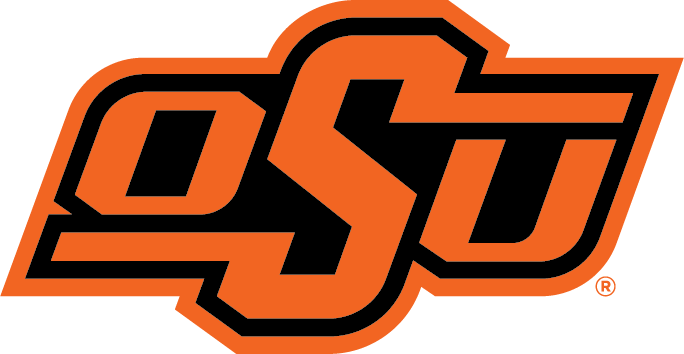
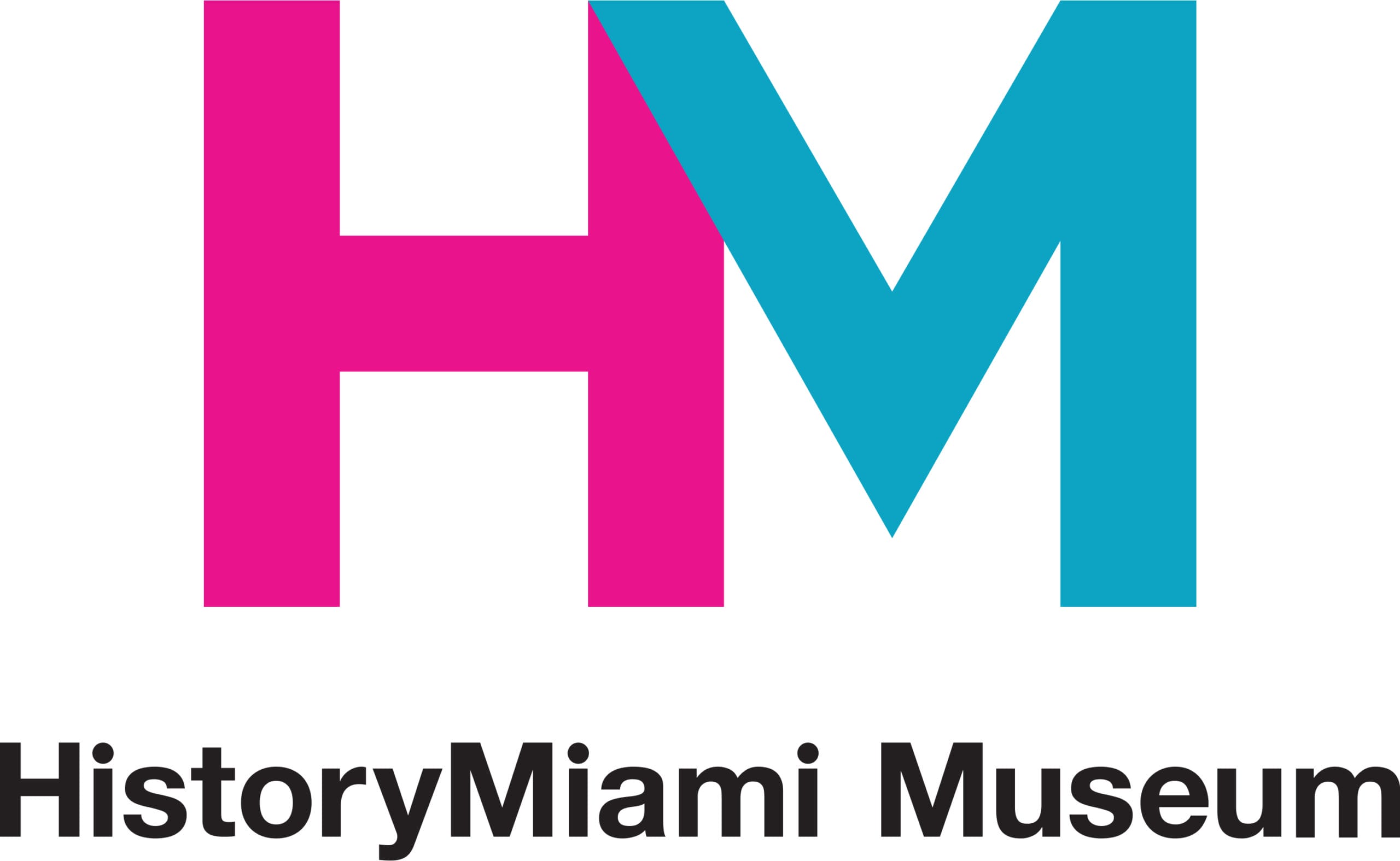
Content created and featured in partnership with the TPS program does not indicate an endorsement by the Library of Congress.

